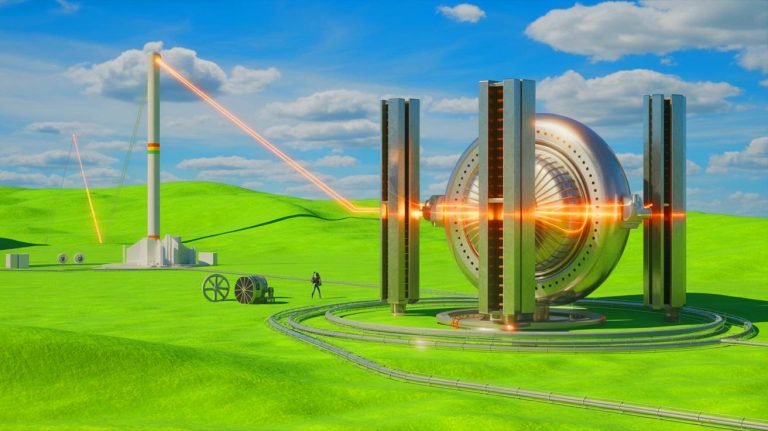| IN A NUTSHELL |
|
In the realm of renewable energy, one of the most ambitious and promising ventures is the development of fusion power. Recently, Commonwealth Fusion Systems (CFS), a Massachusetts-based energy startup, announced a groundbreaking partnership with Google. This collaboration aims to supply 200 megawatts of electricity from its future ARC power plant in Chesterfield County, Virginia. As the world grapples with the urgent need for sustainable energy solutions, this partnership could herald a new era of clean energy.
The Ambitious Vision of Commonwealth Fusion Systems
Commonwealth Fusion Systems has set its sights on a bold vision: to transform the energy landscape by harnessing the power of nuclear fusion. Founded in 2018, CFS has already raised over $2 billion in funding, demonstrating significant investor confidence. At the heart of their strategy is the SPARC reactor, currently under construction in Devens, Massachusetts. This prototype aims to achieve what’s known as net energy gain or Q>1, where the reactor produces more energy than it consumes.
To achieve this, CFS is utilizing advanced superconducting magnets capable of containing plasma at temperatures exceeding 180 million degrees Fahrenheit. If successful, the SPARC reactor will pave the way for the larger ARC reactor, which is projected to generate 400 megawatts of electricity. This is a significant leap forward, as 400 megawatts is comparable to the output of a utility-scale natural gas power plant, potentially powering up to 400,000 average US homes.
Google’s Strategic Investment in Fusion Energy
Google’s involvement with CFS is part of its broader commitment to investing in renewable energy technologies. Since 2010, the tech giant has been at the forefront of acquiring clean energy resources, including geothermal and nuclear energy. In 2024 alone, Google purchased over 8 gigawatts of clean energy. This partnership with CFS underscores Google’s strategic interest in pushing the boundaries of what is possible with nuclear fusion, despite acknowledging it as a moonshot endeavor.
By aligning with CFS, Google is not only investing in a potentially revolutionary energy source but also supporting a vision that could fundamentally alter how we generate electricity. The fusion power plant in Virginia, once operational, will contribute to Google’s ever-expanding portfolio of clean energy investments, reinforcing its commitment to sustainable practices.
The Technical Challenges Ahead
The path to achieving practical fusion energy is fraught with substantial challenges. The process requires heating and compressing atoms to incredibly high temperatures using powerful magnets. Achieving Q>1 is a monumental milestone, but maintaining a stable reaction is equally crucial. The reactor’s components must endure extreme conditions without degrading, ensuring continuous and reliable operation.
Moreover, the technological hurdles extend beyond the physical construction of the reactor. CFS must also develop reliable systems for sustaining the fusion reaction, which involves complex engineering and precise control. The success of this venture will not only depend on overcoming these technical obstacles but also on securing ongoing investment and public support.
The Future of Fusion Energy
The partnership between CFS and Google is a testament to the potential of fusion energy as a viable solution to the world’s energy needs. While nuclear fusion remains an elusive goal for many, the progress made by CFS and other companies in the field continues to inspire hope. As one of nearly 50 privately funded initiatives globally, CFS is at the forefront of a movement that could revolutionize how we produce and consume energy.
As we look to the future, the success of CFS and its ARC power plant could serve as a catalyst for further advancements in fusion technology. This endeavor not only holds the promise of a cleaner, more sustainable energy source but also represents a significant step toward reducing global carbon emissions.
As the world watches with anticipation, the collaboration between Commonwealth Fusion Systems and Google could pave the way for a new era of energy innovation. Will this partnership mark the beginning of a fusion-powered future, and what implications will it have for the global energy landscape? Only time will tell.
Did you like it? 4.5/5 (20)







Wow, if this works, I might finally be able to afford my electric bill! ⚡️
How long before we see this technology actually being used in homes?
Google’s involved? Maybe they’ll finally fix my YouTube recommendations too. 😂
Is this going to be safe? Nuclear fusion sounds pretty intense.
Thank you for the article! It’s exciting to see such big strides in renewable energy.
Can this really power the entire U.S. for centuries, or is that just hype?
Hope this doesn’t turn out to be another Theranos situation. 🤔
What does Q>1 mean exactly? I’m a bit lost on the technical terms.